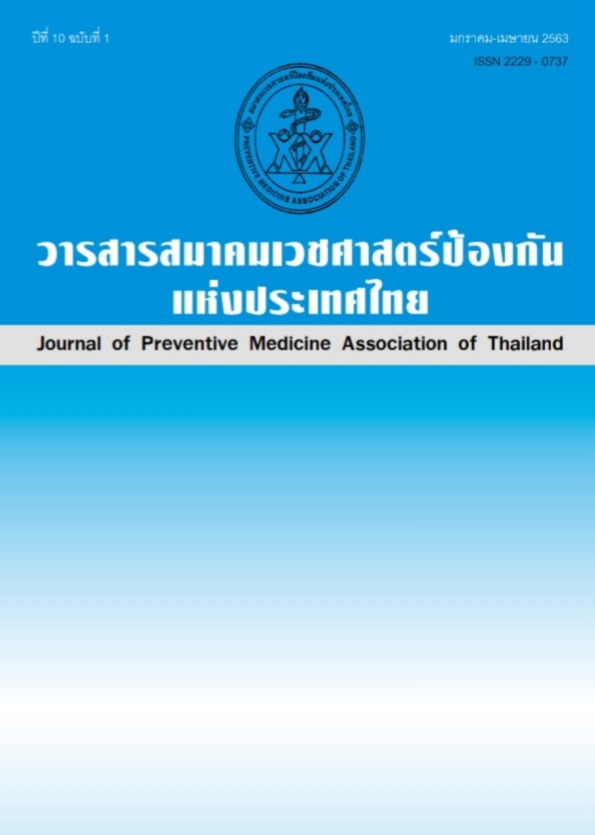Health Behavioral Changes of Patients with Uncontrolled Diabetes Mellitus by a Nutritional Surveillance and Resistance Exercise Program
Keywords:
Health behavioral changes, Patients with uncontrolled diabetes mellitus, Nutritional Surveillance and resistance exerciseAbstract
This action research aimed to study health behavioral changes of patients with uncontrolled diabetes mellitus by a nutritional surveillance and resistance exercise program based on the concept of P (planning), A (acting), O (observing), and R (reflecting). The study population composed of adult participants who had 73 participants tested during study period, 30 uncontrolled Diabetes Mellitus Patients, 13 multidisciplinary team, and 30 village health volunteers. They were divided into 3 phases, plan, action evaluating and reflecting. Data were collected by using the test, practice of diabetic patients, question for interview, group discussion and participatory observation. They were performed from September 2018 to January 2020. Descriptive statistics were done using the number and percentage for categorical variables, mean ±SD, group compared using the paired t-test and the variables that presented a level of significance with a value of <.05 were considered statistically significant and theirs responding 95% confidence intervals (CI). Results: After development, diabetic patients who patients with uncontrolled diabetes mellitus had a lower waist than before development (p-value <.001), with a waist circumference reduced to 4.75 centimeters (95% CI: 3.17, 6.32), decreased body mass index (p-value = .019) with decreased body mass index 0.75 kilograms/square meter (95% CI; 0.42, 1.47) and HbA1c (Hemoglobin A1c) levels less than before development (p-value <.001) with decreased the HbA1c (Hemoglobin A1c) level equal to 0.54% (95% CI; 0.370, 0.709) Conclusions: In this study suggests, that the use of nutrition and resistance exercise as a result, uncontrolled diabetes mellitus patients had waist, body mass index and HbA1C (Hemoglobin A1C) can be reduced.
References
2. อรุณรัตน์ สู่หนองบัว, ไดอาน่า ศรีพรกิจขจร. ผลการพัฒนาเครือข่ายการดูแลผู้ป่วยเบาหวานที่โรงพยาบาลส่งเสริมสุขภาพตำบล อำเภอเมืองชัยภูมิ. ชัยภูมิเวชสาร 2560;37:59-69.
3. โรงพยาบาลเมืองสรวง. รายงานผลการปฏิบัติงานตามยุทธศาสตร์สุขภาพเครือข่ายสุขภาพอำเภอเมืองสรวง ปีงบประมาณ พ.ศ. 2561. ร้อยเอ็ด: กลุ่มงานพัฒนายุทธศาสตร์ โรงพยาบาลเมืองสรวง; 2561.
4. พรทิพย์ มาลาธรรม, ปิยนันท์ พรหมคง, ประคอง อินทรสมบัติ. ปัจจัยทำนายระดับน้ำตาลในเลือดของผู้สูงอายุที่เป็นโรคเบาหวานชนิดที่ 2. รามาธิบดีพยาบาลสาร 2553;16:218-37.
5. สุภาภรณ์ อนุรักษ์อุดม, ศากุล ช่างไม้, สมพันธ์ หิญชีระนันทน์, ศศิมา กุสุมา ณ อยุธยา. ปัจจัยทำนายพฤติกรรมส่งเสริมสุขภาพด้านโภชนาการในผู้ป่วยเบาหวานชนิดที่ 2. รามาธิบดีพยาบาลสาร 2553;16:155-68.
6. Pender NJ. Health promotion in nursing practice. NY: Appleton Century Croft; 1982.
7. Pender NJ. Health promotion in nursing practice. 3rd ed. Stamford: Appleton & Lange; 1996.
8. American Diabetes Association. Implications of the diabetes control and complications trial. Diabetes Care 1997;20:S6-S13.
9. กรมอนามัย. ผู้เป็นเบาหวานเลี่ยงอาหารน้ำตาลสูง เน้นคุมปริมาณข้าว-แป้ง ออกกำลังกายสม่ำเสมอ. นนทบุรี: กรมอนามัย กระทรวงสาธารณสุข; 2562.
10. สุภาพร คำสม, แสทอง ธีระทองคำ, กมลรัตน์ กิตติพิมพานนท์. ผลของโปรแกรมการออกกำลังกายแบบแกว่งแขนต่อน้ำตาลสะสมในเลือดและภาวะโภชนาการของผู้สูงอายุที่เป็นเบาหวานชนิดที่ 2 ในชุมชน. วารสารการปฏิบัติการพยาบาลและผดุงครรภ์ไทย 2560;4:46-60.
11. Kemmis S, McTaggart R. The Action research planer. 3rd ed. Victoria: Deakin University; 1988.
12. อรรถพงษ์ ชุ่มเขียว, กาญจนา ทองบุญนาค, อุบล ชื่นสำราญ, ณัฐิยา ตันตรานนท์. ประสิทธิผลของโปรแกรมควบคุมน้ำหนักที่เน้นเรื่องการปรับเปลี่ยนพฤติกรรมการรับประทานอาหารในนักศึกษาที่มีน้ำหนักเกินหรือเป็นโรคอ้วน. พยาบาลสาร 2562;46:106-17.
13. กมลธร วัสสา, วิพร เสนารักษ์. ผลของโปรแกรมส่งเสริมสุขภาพต่อระดับความดันโลหิตดัชนีมวลกายและเส้นรอบเอวในผู้ที่มีภาวะ Prehypertension. วารสารการพยาบาลและการดูแลสุขภาพ 2558;33:65-73.
14. รัตนา เกียรติเผ่า. ผลของการใช้โปรแกรมปรับเปลี่ยนพฤติกรรมสุขภาพต่อการลดความเสี่ยงโรคความดันโลหิตสูง และโรคเบาหวานของประชากรกลุ่มเสี่ยง ตำบลทัพทัน อำเภอทัพทัน จังหวัดอุทัยธานี. วารสารวิชาการสาธารณสุข 2558;24:405-12.
15. สุพิชญา หวังปิติพาณิชย์, แสงทอง ธีระทองคำ, มะลิวัลย์ ภาคพยัคฆ์. ผลของโปรแกรมการออกกำลังกายแบบแรนสามสิบต่อพฤติกรรมการป้องกันโรคเบาหวาน ดัชนีมวลกายและค่าน้ำตาลในเลือดปลายนิ้วของผู้ที่เสี่ยงต่อเบาหวาน. รามาธิบดีพยาบาลสาร 2560;23:358-70.
16. บุญจันทร์ วงศ์สุนพรัตน์, ฉัตรประอร งามอุโฆษ, น้ำเพชร สายบัวทอง. การควบคุมระดับน้ำตาลในเลือดของผู้เป็นเบาหวานภายหลังเข้าโครงการอบรมความรู้การจัดการเบาหวานด้วยตนเองแบบกลุ่ม. รามาธิบดีพยาบาลสาร 2551;14:289-97.
17. ภิญยา ไปมูลเปี่ยม, พัชนี อินใจ, วินัย ปันทะนะ, ไชยวัฒน์ น้ำเย็น. การพัฒนาระบบการจัดการดูแลผู้ป่วยโรคเบาหวานและโรคความดันโลหิตสูงแบบมีส่วนร่วมของภาคีเครือข่ายชุมชนภายใต้บริบทของโรงพยาบาลส่งเสริมสุขภาพตำบลแม่สาคร อำเภอเวียงสา จังหวัดน่าน. วารสารวิชาการสาธารณสุข 2559;25:395-400.
18. โชติกา สัตนาโค, จุฬาภรณ์ โสตะ. ผลของโปรแกรมการจัดการตนเองเพื่อควบคุมระดับน้ำตาลในเลือดของผู้ป่วยโรคเบาหวานชนิดที่ 2 ที่มีระดับน้ำตาลในเลือดสูง. วารสารการพยาบาลและการศึกษา 2560;10:32-47.
19. Mendes AB, Fittipaldi JA, Neves RC, Chacra AR, Moreira ED Jr. Prevalence and correlates of inadequate glycaemic control: results from a nationwide survey in 6,671 adults with diabetes in Brazil. Acta Diabetol 2010.47:137-45.
20. วิจารณ์ พานิช. การจัดการความรู้ ฉบับนักปฏิบัติ. กรุงเทพฯ: สถาบันส่งเสริมการจัดการความรู้เพื่อสังคม; 2548.
21. Takeuchi H, Nonaka I. Knowledge-Creating Company : Harvard Business Review on Knowledge management. USA: Harvard Business School Press; 1995.
22. Gates B. The Road to the future (The Road Ahead). US: Viking Press; 1999. p.218-88.
23. Bhatt G. Knowledge management in organizations: examining the interaction between technologies, techniques, and people. Journal of Knowledge Management 2001;5:68-75.
Downloads
Published
How to Cite
Issue
Section
License
บทความที่ลงพิมพ์ในวารสารเวชศาสตร์ป้องกันแห่งประเทศไทย ถือเป็นผลงานวิชาการ งานวิจัย วิเคราะห์ วิจารณ์ เป็นความเห็นส่วนตัวของผู้นิพนธ์ กองบรรณาธิการไม่จำเป็นต้องเห็นด้วยเสมอไปและผู้นิพนธ์จะต้องรับผิดชอบต่อบทความของตนเอง






